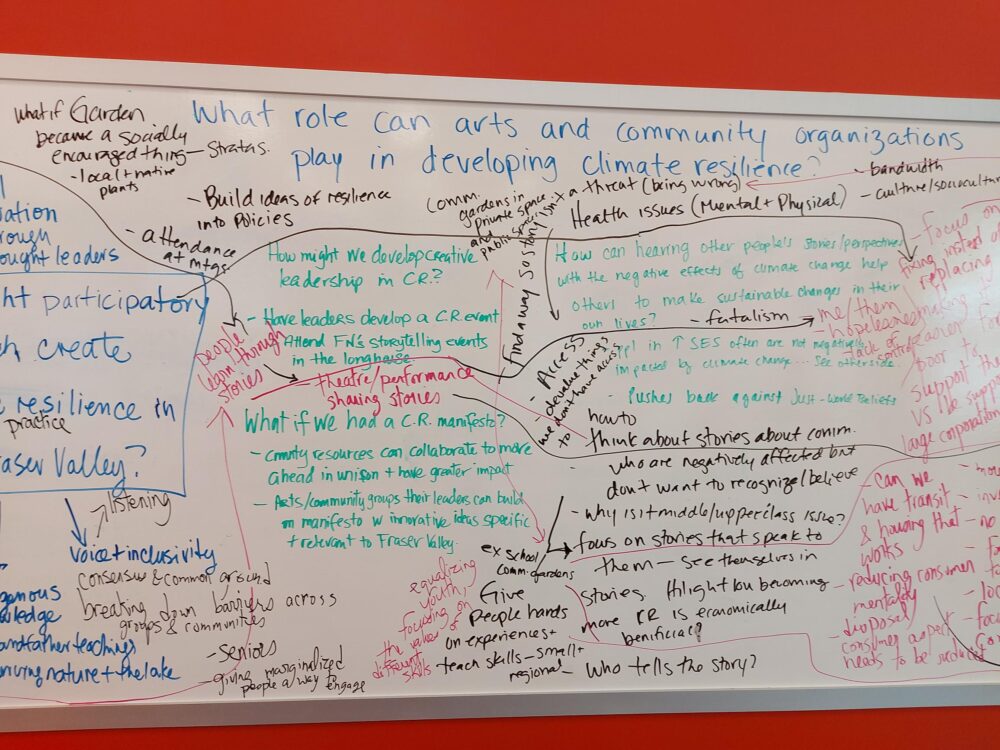Griffith shared her thoughts on the process of bringing the project together, her initial reactions to receiving the funding, and how it helped to bring this project to life.
“There’s so many amazing projects that happen at UFV. There’s so many people working in really interesting ways, so I was really surprised and heartened that they find creativity and this exploration of interdisciplinary conversations worthwhile,” said Griffith on her surprise at receiving the grant.

According to Griffith, the Creativity Lab for Climate Resilience project can trace its roots back to 2019, when she worked with Celinski on another project after receiving the Fund for Innovative Teaching grant (FIT grant).
“We worked with a faculty focus group and had faculty from 10 different disciplines at UFV, from sciences to humanities to staff members and we talked about the best ways to let ideas generate across disciplines. We took those findings and created a framework for facilitating creative idea generation across the disciplines which we tested in a few labs,” said Griffith.
The results of this project helped Grififth and her team “develop the methods” that they further explored in the Creativity Lab for Climate Resilience project .
For the Creativity Lab for Climate Resilience project, Griffith and her team used “the Creativity Lab method” which she explained as, “enhances idea generation across the disciplines and [seeing] if that would also work across communities.”
They achieved this by “expand[ing] who was invited into these Labs” and they ended up working with various members of the community such as UFV students, employees from the UFV Office of Sustainability, Fraser Valley Conservancy, the Golden Ears Transition Initiative, the Abbotsford School District, The Abbotsford Community Foundation, local artists, Fraser Basin, Abbotsford Arts Council and Fraser Health, to name a few.
“Sustainability is something that’s really important to me and the work that I do,” Griffith added. “Each of the Labs had a different focus question and it brought together people from different disciplines at the university and different representatives from community groups and then just some people who aren’t necessarily affiliated with this special interest group but they just were interested in this question and they came to have the conversations.”
Griffith explained that the Labs brought members in the community together to work on “creating solutions and ideas on how to actually move the Fraser Valley toward climate resiliency.”
During the interview, Griffith explained one of the themes that came up was education and the function it plays in giving young people the knowledge and the voice they need to share their ideas, because they are invested in and concerned about climate change more so than adults.
“They have great ideas because they are not so limited in their thinking,” said Griffith.
Griffith explained that people were “surprised, pleased and inspired by the fact that the university was willing to give space to hold these conversations.” She stated that although “many of the organizations are actively working on conservation or sustainability issues or climate regeneration issues, they don’t necessarily have a really strong relationship with the university. What this grant has allowed us to do is to start to make some of those relationships, to create some bridges with the community and then hopefully those relationships [will] continue to build.”
“One of the things that was expressed is that many people want to continue to have these conversations and want to continue to work across communities, across disciplines and everyone was really energized by the work and so hopefully this is just the start.
“When [people are] given the permission to play with ideas or pushed with tight time limits on how they have to interact with one another, they rise to the challenge and they find it fun, they laugh, and all of their barriers start to come down and the ideas start to flow better,” Griffith added.
The interactions with different members of the community helped Griffith and her team find varying perspectives to different questions that were posed in each lab and the thoughts that came out of these labs became part of a “seed bank of ideas” which was in the process of being written up for publication at the time of the interview. The project exceeded her expectations because of the various groups of people who partook in the project and the ideas and perspective that they offered. Griffith adds that she hopes to continue working with this method with more students in the future.
Disclosure: Hannah Celinski is a faculty representative on the Cascade Journalism Society board of directors.
Rachel is working towards a BA with a concentration in English and Theatre. She has been employed at The Cascade since Fall 2021 as a Staff Writer and a Jr. News Editor. Currently, she is the sectional News Editor and enjoys meeting and interviewing people as well as taking long walks in nature. Rachel also likes to stay up to date on the latest trends and informs students through her fashion column entitled Campus Fashion.


